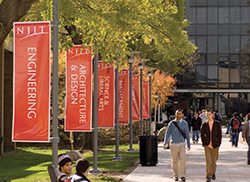
Graduate Degrees for Working Adults
Colleges and universities see the return of employed students.
By Michael Silverstein, Contributing Writer On Aug 17, 2015A great many working adults are having a hard time making ends meet, as they recover from the Great Recession. It would make sense, then, that this group would be less inclined than in years past to spend money to acquire graduate degrees and certificates, or seek other forms of post-graduate education. Yet, just the opposite is true. More of them are finding it worthwhile (and even necessary) to fit graduate education into their busy work and family lives.
New Jersey colleges, both public and private, are stepping up to accommodate these returning students. They are not only doing so with traditional post-graduate offerings such as MBAs, but with new variants of these long popular degrees, plus an ever-growing selection of programs in fields with emerging marketplace caché. Course work is also being made available in more formats than ever before.
Not Just About Extra Money
Many studies show a direct relationship between levels of education and income. One released a few years back by the Bureau of Labor Statistics, for example, listed the weekly average for those with an advanced degree at $1,361, those with only a bachelor degree at $1,038, and $734 for those with just some college or an associate’s degree.
However, hoped for extra income isn’t the only thing that’s bringing working adults back to institutions of higher learning. Explains Dr. Joyce A. Strawser, dean, Stillman School of Business at Seton Hall: “A lot of our adult students come looking to refresh their skills. They might have a degree in a specialty they got even just five years ago … and have to refresh,” because things have changed so much in that specialty.
Prospects, when it comes to career building, are also improved with an advanced degree. Strawser cites a study that found that more than 9 in 10 US companies plan to hire MBA grads in 2016, up from 80 percent in 2014.
And then, of course, there’s the networking possibilities of such programs. “Students studying with other working professionals make [potentially useful] contacts,” Strawser says.
Pressure to improve workplace skills with more education often comes from employers, says Janice Recca, assistant director of graduate admissions, Fairleigh Dickinson University. “Nurses in hospitals [for example] are now strongly encouraged to get an MS.”
Many of the mid-career professionals who come to us already have a lot of education, says Dr. Michael Williams, dean of the School of Business and Management, Thomas Edison State College. But it may no longer be enough for their present job or the job they hope to get. “They need those extra management skills,” he says.
Acquisition of more skills for a particular job may not be the only thing some working adults seek in post-graduate studies. Something more basic may be the goal. While you may not see a bigger payback in the first year, notes Christopher Romano, vice president of enrollment management and student affairs at Ramapo College of New Jersey in Mahwah, “there’s intrinsic value in getting critical thinking abilities enhanced in a traditional liberal arts school” setting.
Tuition Spreads
“Meeting tuition costs is always challenging,” acknowledges Dr. Joan C. Ficke, dean of the graduate school, Montclair State University. “Our graduate students are no better heeled than undergraduate ones” in this regard. So, whether or not to seek graduate education “is often a family decision.”
State colleges are still a comparative bargain when it comes to tuition, she continues. “We’re always trying to help our students here, pushing for more graduate scholarships and seeking [financial] help from former students.”
Happily, things on the employer reimbursement front are now improving. “This fell off for years after 2008,” according to Ficke, “but is picking up again.”
For in-state graduate students, says Daniel Elwell, vice president for university advancement at New Jersey City University, along with being aggressive in finding student aid, “our tuition is just $629 per credit, the lowest in New Jersey. “So, our students graduate with the smallest debt … and they have the greatest return on investment.”
At Thomas Edison State College, the cost of a 39-credit MBA degree is $660 per credit, while the cost of a 36-credit MS degree is $617 per credit. “We’re a low cost provider,” says Williams. “Mid-career students can more often afford these costs.”
Most graduate credits at another public institution – Ramapo College – are a modest $700 a credit. And employer contributions that relieve students of some of the financial load seem to be picking up. “A year ago, I would have said employers had definitely cut back. Now, their contributions have begun to pick up again,” Romano says.
When it comes to student out-of-pocket graduate study costs, while state schools may be less costly than private institutions on a credit-by-credit basis, a number of other factors usually play important roles in determining a student’s actual net tuition.
Fairleigh Dickinson’s charges vary from $1,152 a credit to $1,186 in some divisions, with blended course work completed online and in-class being less expensive, and fully online even less expensive. School grants and scholarships can reduce any of these costs significantly.
“We’re also seeing more companies paying all tuition expenses in programs approved by their HR departments,” Recca says. “Large pharma, banking and healthcare organizations have always provided this kind of support, but much more is being provided again after a dip. …They need the talent development, it helps retain people they want to keep.”
Changing Demographics
Some demographic trends are on view at most institutions contacted for this story. Except for a few still male -dominated programs such as MBAs, women now comprise the majority of graduate students in New Jersey. “More women are heading households and have, or are seeking, leadership positions,” Recca says. “While Elwell from NJCU reports: Seventy-two percent of our own graduate population is female.”
Graduate students are typically mid-career people in their mid-30s. However, another fast growing age group consists of younger 22-24-year-old recent undergrads. “At our school, that [latter] age group is up 60 percent in the last four years,” Romano reports. “Just to get in the door at a lot of places today, to get to the top of the resume pile, you need an advanced degree.”
Ficke’s own school numbers seem to support these demographic trends. “Fifty percent of our graduate students are now 25 or younger. They are much younger than they used to be. And,” she adds, “70 percent now are women.”
How Programs Are Offered
There’s no longer a standard way to take graduate courses. Along with the traditional evenings and Saturdays classes conducted on campus, several other options are now frequently offered.
“Our mission is flexibility for self-directed adults,” according to Williams. “All of our course work is online, available 24/7, so students don’t have to sacrifice their careers or time away from their families to visit a campus or physical classroom.”
“Along with traditional MBA programs that run evenings and Saturdays,” Recca says, “we have a popular blended accelerated program in our business school. Half [is accomplished] in-class on Saturdays, the other half online.”
The increasingly popular online choice is complicated, however, notes Ficke. Many students “want face time with teachers and other students … faculty often doesn’t want to teach only online either.” And, Romano says: “There’s definitely still a market among students who believe in the value of face-to-face with faculty and other students. …The peer effect is a strong selling point.”
“The teaching format chosen depends a lot on the subjects being taught,” according to Elwell. “Some are more labor intensive, requiring you be there in person. A nursing course with lab work, for example, requires students be there in person, while business courses can be more online.”
What’s New, What’s Hot
When it comes to graduate courses for working adults, student and school preferences aren’t the only determiner of what’s offered. Changing or evolving market conditions often call the shots.
Graduate schools all work to address this reality, a response nicely summed up by Strawser: “We’re always looking for these new areas … always want to be on the cutting edge with what we’re offering.”
Here are some of the new programs being offered in New Jersey, or older ones that are now in greater demand:
- A new program in market research at Seton Hall, and a certification program being developed there in data analytics;
- A master of science in international business finance at Thomas Edison State College;
- A master of arts in organizational behavior for leadership training in many industries, and a masters in homeland security that is law enforcement focused at Farleigh Dickinson;
- An accelerated RN and bachelor of science in nursing program, and a new cyber, and counter-insurgency security program for students working in fields such as finance as well as law enforcement at New Jersey City University;
- A number of professional science master degrees for people who may not be scientists, but work in science settings offered at Montclair State University;
- And a new MS in social work that begins this fall at Ramapo College of New Jersey that will tap into growing demand for social work specialties, such as gerontology care.
As ever-changing markets have ever-changing needs for working adults with new or improved skills, New Jersey’s educational institutions are stepping up and providing these skills.
Keeping Companies In New Jersey
NJIT offers training to individuals and companies

Gale T. Spak is an associate vice president of continuing & distance education at NJIT. Her own unit’s training and development arm is STEM education (science, technology engineering and mathematics). “Everyone needs IT skills these days. It underpins everything.”
Courses for individual students in her professional development area run at different times during the year and their lengths vary. Costs vary, too, ranging from as much as $3,995, to as little as a one day project management overview that costs just $325. “There’s been a very strong demand for all these offerings,” she says, “because they make a nice addition to a resume.”
There’s a number of ways their costs are covered – by the student, his/her company, with grants from the state, or with GI Bill coverage.
NJIT also does a lot of customized training for small- and medium-sized firms that need people with specialized skills. These companies can’t do their own training “because they are too small or may have cut their own training group,” Spak says. This training is often paid for with grants from the state, and a state approved education provider like NJIT must be used.
“A company will come to us,” Spak says, “we talk to the management, determine its needs, help get the state grant, and find a teacher to do the customized training.”
And who are these companies? “They could be an advanced manufacturer that wants to expand,” Spak says. “They need people with the right training to remain in New Jersey.”
Related Articles:






